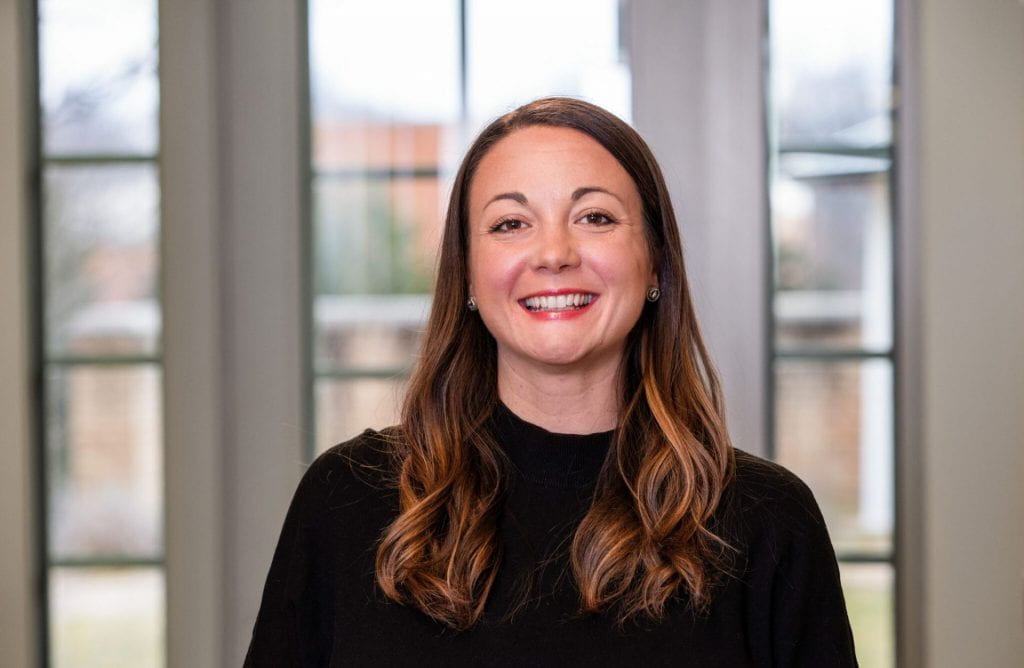We were thrilled to welcome Stephanie Weiskopf to the Civic Scholars Program team this fall as the lead instructor for the Class of 2023. At WashU, Stephanie also serves as the Associate Director for Residential Faculty Engagement.
Meet, Stephanie!
Stephanie, tell us a little about yourself.
I am a St. Louis transplant who often makes conversation with St. Louisans to learn when you officially get to “claim it” as home. One day I’m hoping for an official ceremony of sorts. Things I think people like to know – I grew up in Phoenix, AZ, and went to college at the University of Montana where I studied Organizational Communication and International Studies. I spent a year traveling for my sorority, followed by a year of working in grocery stores, and then went to graduate school at Seattle University where I studied Student Development Administration.
I love animals and spend a lot of time trying to rescue them, which over the pandemic has included a goat, a parakeet, and nine dogs. My pack includes three misfit dogs and two dog moms, and we spoil our babies rotten. I have worked at WashU since 2012 in Campus Life, Center for Diversity and Inclusion, and now Residential Life. I had a one-year “sabbatical” working at Wellesley College as the Director of Student Involvement and Leadership before returning to St. Louis and WashU.
I am happiest when deeply connecting with others and being part of a community.
What drew you to the opportunity to be the lead instructor for the Civic Scholars Junior Class?
I have always considered myself a friend of Civic Scholars. I have been a part of the selection process in the past, nominated countless sophomores, admired the instructor team, and some of my closest student relationships have been with Civic Scholars. I was overjoyed to learn it was an opportunity I could pursue. Closeness to this program is closeness to innovation, dialogue, growth, and authenticity. I was eager to be a part of the instructor team and support the program this year.
What have you enjoyed most about being an instructor for the course?
That’s a tough question! I could share a very long list but will start with three things:
- The cohort. Being a longtime friend of the program, I know just how powerful the cohort experience can be. Being let in to the lives of these students is a privilege I take very seriously.
- The journey of the fall assignments ending with the final public narrative. I have really enjoyed reading each student’s development of story of self, us, and now throughout the semester, alongside the in-class sharing and exploration. The tracks have run parallel in so many ways ending the semester with a powerful narrative from each student.
- Being a part of the instructor team with Dwayne T. James, Genesis, and Theresa. I have learned so much from each of them and they make me want to be better.
What is something you want alumni to know about the junior cohort?
The junior cohort is incredible. They are open and curious, and passionate. I see a community of people who demonstrate a deep mutual respect for one another and investment in personal and community growth. One thing to know about fall 2021 is that the junior and senior fall break immersion trip was in Kansas City, which was a great learning experience for us all.

How can alumni support this cohort with their Civic Summer projects?
The junior cohort has many different interests, passions, and plans for summer. I think they would benefit most from connecting with you all on the phone, Zoom, in-person, etc. Valuable conversations could be about your experience as a Wash U student, your Civic Summer planning process, your passions and experiences, and your knowledge and networks.
One question we’ve asked them to keep in mind as we transition to spring is “How will you know you’re successful at the end?” Any offerings you could share about your process would be impactful.
Specific shout out to anyone involved with campus organizing and activism at WashU: reach out to Maurice Wang (mauricewang@wustl.edu) to support his project.
